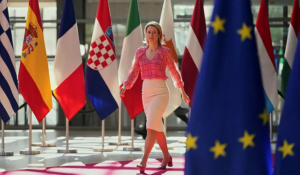‘Diplomatic tsunami’ nears as Europe begins to act against Israel’s ‘complete madness’ in Gaza

European Union foreign policy chief Kaja Kallas arrives for a meeting of EU defense ministers at the European Council building in Brussels, 20 May 2025
Jonathan Lis and Liza Rozovsky report in Haaretz on 21 May 2025:
The wave of diplomatic incidents involving Israel throughout Tuesday has been exceptional by any standard.
“The situation in Gaza is unbearable,” a foreign diplomat familiar with the international efforts against Israel told Haaretz. “It’s time to stop. Images of children scrambling for a plate of rice, reports of real hunger, and the fact that Israel isn’t doing enough to facilitate humanitarian aid make it impossible for us to stand by any longer,” he added.
Since Monday, crisis has followed crisis: the leaders of France, the U.K., and Canada announced they may consider sanctions against Israel; 25 Western countries issued a joint statement expressing concern over Gaza; the U.K. government suspended talks on a free trade agreement with Israel; British Foreign Secretary David Lammy announced sanctions on Israeli settlers and summoned Israeli Ambassador Tzipi Hotovely for a formal reprimand.
At the same time, Swedish Foreign Minister Maria Malmer Stenergard declared her intent to promote sanctions against Israeli ministers – a move that was later blocked. French Foreign Minister Jean-Noël Barrot said Tuesday that he supports reconsidering the EU–Israel Association Agreement. Just hours later, at the initiative of the Dutch foreign minister, EU foreign ministers gathered in Brussels to discuss suspending the agreement.
Seventeen of the EU’s 27 member states voted to re-examine the legal basis of the EU–Israel Association Agreement. While full cancellation would require consensus and is considered unlikely, a qualified majority could suspend specific parts, such as the free trade deal that exempts Israeli exports from tariffs, or the Horizon program, which allows Israeli participation in European science and technology projects.
Israeli officials took comfort in Germany, Italy, and Greece’s support, which voted alongside Israel at the EU Commission. The Israeli Foreign Ministry currently doubts that the agreement will be revoked altogether but acknowledges that the decision to review it is a serious diplomatic warning.
A senior Israeli official told Haaretz the developments were expected. “The statement from Kaja Kallas was unfortunate, but it could have been worse,” he said of the chief EU diplomat’s comments. “The past 24 hours were all part of a planned ambush we knew about. This was a coordinated sequence of moves ahead of the EU meeting in Brussels, and thanks to joint efforts by our ambassadors and the foreign minister, we managed to moderate the outcome,” the official said.
“The bullet has left the barrel,” said Maya Sion-Tzidkiyahu, Director of the Israel–Europe Relations Program at the Mitvim Institute and lecturer at the Hebrew University’s European Forum. “There’s no telling where this will lead or how the legal review will conclude. This step further isolates Israel as a pariah state, losing some of its closest friends in Europe.”
According to her, “This shift happened fast, in just two weeks, and the decision may trigger a diplomatic tsunami.”
“This is a very clear message to Israel: we’ve had enough of a senseless war. You’re increasingly seen as a country whose values no longer align with those of the European Union,” Sion-Tzidkiyahu added.
Foreign Minister Gideon Sa’ar has held talks in recent days with around ten European foreign ministers and heard strong criticism from them. At Sunday’s cabinet meeting, he warned ministers that European criticism could soon be accompanied by concrete actions. Israeli army officials confirmed that Israeli monitoring systems also show the humanitarian situation in Gaza nearing a red line, with immediate aid needed.
Prime Minister Benjamin Netanyahu approved the entry of aid into Gaza without delay in coordination with the U.S. As trucks began to move, Israeli officials quickly informed counterparts that Israel was indeed acting to alleviate hunger and was not relying on declarations alone. A source familiar with the details said Netanyahu plans to issue a formal statement Wednesday in response to the Western measures.
Still, Israel’s sudden response did little to satisfy the international community. Several European countries criticized the new aid distribution plan, set to begin in two weeks.
“It’s complete madness,” a European diplomat told Haaretz. “There’s no way this will work. Israel is shutting down 400 food distribution points in Gaza and replacing them with four or five. That means 6,000 people at each point. I desperately hope they don’t go through with this – it would be a disaster.”
Sion-Tzidkiyahu estimated that the very fact that the EU is now debating Israeli violations of international law sends a strong signal not only to international courts, but possibly even to people in Trump’s orbit, who may be attuned to these messages.
Looking ahead, Israeli officials are already bracing for the next flashpoint. France and Saudi Arabia are expected to convene a conference in New York in June to announce recognition of a Palestinian state. According to sources, the initiative is primarily Saudi, designed to deliver a symbolic diplomatic achievement reflecting concern for the Palestinian people. However, officials now believe the organizers are working to expand the number of countries backing the move.
President Isaac Herzog, who attended the pope’s inauguration in the Vatican on Sunday, made an unannounced stop in Paris for a meeting with President Emmanuel Macron. Herzog, who often carries out quiet diplomatic missions, reportedly raised both the hostage issue and Israel’s concern about the French–Saudi initiative. Israeli officials believe it will be difficult to stop the recognition plan, which is expected to move forward as planned.
This article is reproduced in its entirety
